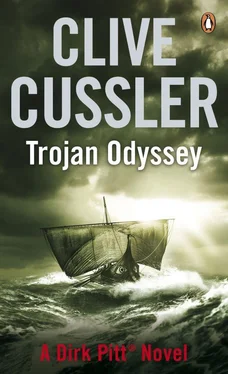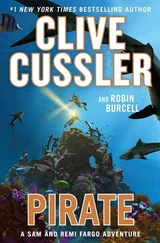"Yes, Epona, I'm here."
"Why are you calling on an open line from a hotel?"
"We have an unexpected problem."
"Yes?"
"A NUMA research boat looking for the source of the brown crud was not deceived by the hologram and destroyed our yacht."
"Understood," said the woman called Epona, without the slightest trace of emotion. "Where are you?"
"After our yacht sank, I was captured by the NUMA people, who held me prisoner. I escaped and am now sitting in a room at the Rio Colorado Lodge. It's only matter of minutes before the local police trail me here."
"Our crew?"
"Some were killed. The rest escaped in the helicopter and abandoned me."
"They will be dealt with." The voice paused. "Did they interrogate you?"
"They tried, but I gave them a phony story and told them my name was Rita Anderson."
"Keep the line open and wait."
Flidais, alias Rita, went to the closet and found a flowered-print summer dress that was a size ten to her size eight. Close enough, she thought. Better large than too small. She pulled it on over her bikini and found a scarf, which she tied around her head to hide her red hair. It didn't bother her in the least that she was stealing another woman's clothes and running up a large phone bill, certainly not after having killed Renee. Next she pulled on open sandals that were a close fit. A pair of sunglasses were sitting on a bed stand, so she slipped them on.
She smiled to herself as she searched the drawers of the dresser and found the room occupant's purse. Why women never used any creativity in hiding their valuables was a mystery to Flidais. It was well known among hotel thieves that women invariably hid their purses, including their wallets, under their clothes in a drawer. She found eight hundred dollars American and a few Costa Rican colones. With an exchange rate of 369,000 colones to the dollar, most monetary transactions in Costa Rica were handled in foreign currency.
Barbara Hacken was the name below the picture of the face on the driver's license and the photo inside the passport. Except for a different hair color and a few years' difference in age, they might have passed for sisters. Flidais cracked the door to see if the room's occupant was coming up the walkway, when Epona came back on the line. "All is arranged, sister. I'm sending my private plane to pick you up at the airport. It will be waiting on the tarmac when you arrive. Do you have transportation?"
"The hotel should have a car to carry guests to and from the airport."
"You may have to show identification to get past airport security."
"All is established on that score," answered Flidais, slinging the purse strap over her shoulder. "I'll see you and our sisters at the ritual in three days."
Then she hung up and walked to the hotel lobby past two local uniformed policemen who were checking the grounds. Looking for a woman last seen in a bikini, they gave her a quick glance, thinking she was a guest of the lodge, and passed on. She spotted Barbara Hacken sunning at the pool. She looked to be dozing. When Flidais reached the lobby, the owner of the lodge was standing behind the desk and smiled when she asked for a car.
"You and your husband are not leaving us, I hope."
"No," she said vaguely, scratching her nose to cover her face. "He's still out on the river after the big ones. I'm meeting some friends who are dropping in at the airport to refuel before continuing on to Panama City."
"We'll see you for dinner?"
"Of course," Flidais said, turning away. "Where else would I eat?"
When her car reached the airport gate to the tarmac, the driver stopped, as the security guard stepped from a small office.
"Are you leaving Rio Colorado?" he asked Flidais through the open window.
"Yes, I'm flying to Managua."
"Passport, please?"
She handed him Barbara Hacken's passport and sat back looking out the opposite window.
The guard went by the book. He took a long moment comparing the passport photo with Flidais's facial features. The hair was covered by a scarf, but a few red strands seeped from under the silk. He was not concerned. Women seldom tinted their hair the same color they wore the month before. The face seemed similar, but he could not see the eyes behind the sunglasses.
"Please open your luggage."
"Sorry, I don't have luggage. Tomorrow is my husband's birthday. I forgot to buy him a gift, so I'm on a shopping trip to Managua. I intend to return in the morning."
Satisfied, the guard handed back the passport and waved the car through.
Five minutes later, everyone within a mile of the airport stared in awe as a lavender-colored aircraft that looked too large to land on the airstrip came in low over the trees and set down smoothly. Reversing engines and braking, it stopped a hundred yards short of the runway's north end. Then it turned and taxied to where Flidais was waiting in the car. Five minutes later, she was aloft on the Beriev Be-210 bound for Panama City.
The two men casually lolling in what the native villagers called a panga looked like any of the local men who fished the Rio San Juan. They wore baggy white shorts and T-shirts with soft white baseball-style caps. Two outriggers hung over the panga's stern on an angle, their lines trolling for the fishermen's next dinner.
Except for a passing experienced fisherman who bothered to notice, no one on shore would have guessed the lines carried no hooks. In a waterway teeming with fish, no hook went without a bite more than a few seconds after it dropped under the surface.
The skiff was propelled by a thirty-horsepower Mariner outboard steered by cables running to a center console-column surmounted by an automobile steering wheel. The flat-bottomed, twenty-foot panga moved smartly up the calm river through the tropical rain forest under a light shower. They were traveling in the middle of the long rainy season that began in May and lasted through January. The jungle vegetation was so thick along the shore it seemed that every plant was in constant battle against its neighbor for a glimpse of the sun that beamed down infrequently through the never-ending mass of clouds.
Pitt and Giordino had purchased the panga, whose bow was painted with the name Greek Angel, along with fuel and supplies, within hours after the NUMA jet had taken off for Washington with Rudi Gunn, Patrick Dodge and Renee Ford's body. The repair crew that was flown into Barra Colorado had beached Poco Bonito at low tide and were working efficiently to make her seaworthy for the voyage north.
Jack McGee threw them a going-away party and insisted on stocking their boat with enough beer and wine to start a saloon. Inspector Ortega was on hand, graciously expressing his appreciation for their cooperation in his investigation, and his sorrow for Renee's senseless murder. He was also irritated and regretful that the woman they knew as Rita Anderson had eluded his dragnet. Once Ortega's team learned of Barbara Hacken's missing passport, and they interrogated the owner of the lodge and the security guard at the airport gate, they were certain Rita had fled Costa Rica to the United States. Pitt added a piece to the puzzle when he heard the aircraft was painted lavender. This fact placed Rita squarely in the Odyssey camp. Now Ortega vowed to pursue Renee's murder internationally and to seek the cooperation of American law enforcement.
Pitt sat relaxed, leaned back in a raised chair in front of the wheel column, and steered the boat with one foot as they passed quiet picturesque lagoons that opened onto the river. Giordino had borrowed a lounge chair and pad from McGee, and reclined with his feet hanging over the bow, warily eyeing the occasional eighteen-foot crocodile that he spotted sunning itself on the bank.
Читать дальше












